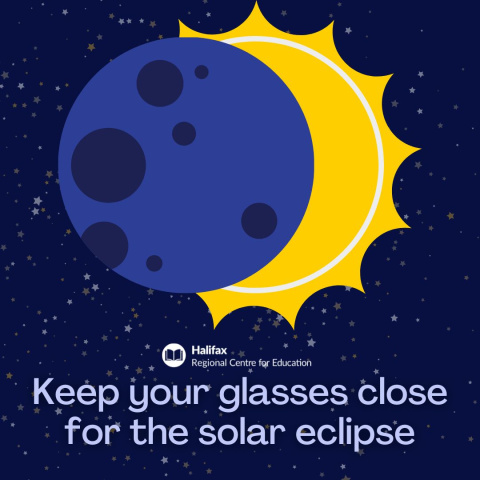Solar Eclipse Information

Families,
Today is an exciting day as we await the total solar eclipse that will begin around 3:30 p.m. This event has presented a great opportunity for students (and families!) to learn about the wonders of astronomy and the eclipse phenomenon.
The Department of Education and Early Childhood Development is pleased to provide all students in Nova Scotia with eclipse glasses to view the solar eclipse safely, which will be distributed in classrooms today if they haven’t been already.
A solar eclipse occurs when the moon passes between the Earth and the sun, obscuring the view of the sun from a section of the Earth. This event is extremely rare, with the next solar eclipse not occurring in the province until 2079. Nova Scotia will be just outside of the zone of totality for the solar eclipse; for this reason, it is important that individuals have appropriate protection to view this historic event.
The solar eclipse will begin at 3:27 p.m., reaching maximum coverage at 4:38 p.m., and ending at 5:44 p.m. The following are safety precautions that should be taken while the eclipse is visible today.
- Do not look at the sun without proper eye protection: You should never look at the sun without eye protection. During the eclipse, do not look at the sun without international safety standard (ISO) solar eclipse glasses. Everyday sunglasses are not enough protection for your eyes during an eclipse.
- Wear your solar eclipse glasses: All schools have received international safety standard solar eclipse glasses to support safe viewing of the eclipse for students. The solar filters in eclipse glasses are specifically designed to protect eyes from the intense brightness of the sun. They block out most of the sun’s light along with ultraviolet and infrared radiation that would otherwise harm eyes.
- Make sure your solar eclipse glasses aren’t damaged: Ensure there are no bends, holes or scratches. Do not use damaged solar eclipse glasses.
- Supervise children: Ensure that children are supervised and understand the importance of not looking directly at the sun during the eclipse.
- Be cautious with cameras and binoculars: Do not use cameras, binoculars or telescopes to view the eclipse without appropriate solar filters. Looking through these devices without proper protection can amplify the intensity of sunlight and cause serious eye injury.
- Monitor duration of viewing: Even with your eclipse glasses, limit the duration of direct viewing of the eclipse. Prolonged exposure can still pose risks to eye health.
More information can be found on the following websites:
Anyone without proper eye protection or whose solar eclipse glasses have been damaged can still track and watch the eclipse on NASA’s live eclipse broadcast.
Enjoy this unique event!